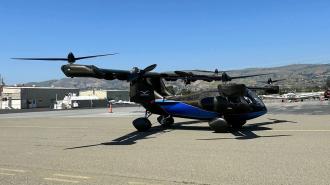The FAA has given air mobility startup Aska the go-ahead to begin flight testing the Aska A5, a beast of a flying car that’s about the size of an SUV and costs an eye-watering $789,000.
The Aska A5: A growing number of startups believe the next big thing in ride-hailing will be flying taxis.
Most of these startups are developing small eVTOLs, aircraft that take off and land vertically like helicopters. Those vehicles typically aren’t designed to drive on roads, which means they can only operate from places with landing pads.
Aska is one of the exceptions.
Its four-seater flying car — the Aska A5 — can take off and land vertically, like a helicopter, or horizontally on a runway, like a traditional airplane. But when its wings are folded in, it’s small enough to drive on public roads and fit into standard parking spots.
While most eVTOLs are fully electric, the Aska A5 is a gas/electric hybrid that can be powered up at home and EV charging stations or fueled up at standard gas stations. As for performance, it has an expected flight range of 250 miles and a top speed of 150 mph in the air and 70 mph on the ground.
Looking ahead: Aska plans to start renting the A5 to pilots in 2026 so that they can then use it to provide on-demand rides to passengers. Alternatively, it’s also prepared to outright sell the Aska A5 to customers for $789,000 and is already accepting preorders for $5,000 down.
While Aska won’t be able to sell or rent its flying car to anyone until it’s certified by the FAA, the company is making progress on that front. In June 2023, it announced that it had received approval to begin flight tests with a full-scale prototype and had begun the FAA certification process.
As for ground transportation, Aska revealed on July 20 that the Aska A5 is authorized by the Department of Motor Vehicles to drive on public roads and has already undergone more than 300 miles of road testing.
“Being the first electric flying car developer to be successfully conducting driving tests on local roads in California validates our efforts to develop an eVTOL that is roadable and with an emphasis on safety,” said Maki Kaplinsky, Aska’s COO and co-founder.
We’d love to hear from you! If you have a comment about this article or if you have a tip for a future Freethink story, please email us at tips@freethink.com.
